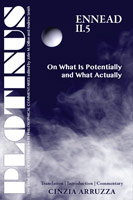
 |
PLOTINUS Ennead II.5:
On What Is Potentially
and What Actually
Translation, with an Introduction, and Commentary
THE ENNEADS OF PLOTINUS
—WITH PHILOSOPHICAL COMMENTARIES
Series Edited by
John M. Dillon and Andrew Smith
July 2015
978–1–930972–63-6
212 pages • 5 x 7.5 • Paperback
$37.00
|
|
 Cinzia Arruzza Cinzia Arruzza
is Assistant Professor of Philosophy at the New School for Social Research, in New York City. She received her PhD from the University of Rome Tor Vergata and subsequently studied at the Universities of Fribourg (Switzerland) and Bonn (Germany). She has a special interest in ancient metaphysics and political philosophy, with a particular focus on Plato, Aristotle, Plotinus, and Patristic thought. She is the author of Les Mésaventures de la théodicée. Plotin, Origène et Grégoire de Nysse (Turnhout: Brepols Publishers, 2011).
Errata
P. 26, line 2-3 "the Megarian claim that something is in potentiality before its actualization” should read "the Megarian claim that something is not in potentiality before its actualization"
|
|
|
|
|
The term dunamis (potentiality) entered into the philosophical vocabulary with Plato, but it was with Aristotle that it acquired, together with energeia (actuality), the strong technical meaning that the two terms have maintained, with variations, throughout subsequent philosophical tradition.
The significance of the notions of actuality and potentiality in Plotinus’ thought can hardly be overstated. Throughout the Enneads, they are crucial to understanding the specific causality of intelligible realities and the relation of participation between intelligible and sensible realms.
In Ennead II.5, Plotinus for the first time provides a systematic clarification of his peculiar use of these terms, through a sustained revision of Aristotle’s own elaboration of the topic and of his terminology. The treatise discusses the different meanings of potentiality and
actuality as well as the way each of them applies or does not apply to the sensible realm, to the intelligible realm, and to matter.
While the structure of the text unfolds in a coherent and cohesive manner, Plotinus’ writing in this treatise is dense and at times dry in its technicality. The detailed commentary guides the reader step by step, making an otherwise particularly difficult text accessible. Plotinus was a Platonist, committed to expounding the doctrines put forward by Plato some seven centuries earlier. He was born and educated in Egypt, where he studied the teachings of Plato under the guidance of Ammonius Saccas. He came to Rome in 244 CE and built up a circle of followers devoted to studying Plato through Plato's own works and those of philosophers, both Platonist and non-Platonist, of the intervening centuries. From his fiftieth year Plotinus himself wrote down, in Greek, the findings of the seminars, and these writings were later edited by one of his pupils, Porphyry, and published in six groups of nine treatises entitled the Enneads (from the Greek word for nine – ennea).
Errata: |
|
| International Journal of the Platonic Tradition |
"Arruzza’s book provides the reader with an excellent translation and a clear and informative discussion of Plotinus’ arguments."
(Read the entire review here) |
|
| Bryn Mawr Classical Review |
"This text is difficult due to Plotinus’ dense style. Based on the inclusion of important research in recent years, such as that of Narbonne and Kalligas, and on the author’s own contributions, Cinzia Arruzza’s new English translation is an improvement compared with the older ones. And her clear commentary not only sheds light upon the difficult text, but also offers innovative investigation of and answers to the controversial problems in this treatise."
(Read the entire review here) |
—Sui Han
Beijing |
|
| “A splendid piece of scholarship, which successfully combines philological accuracy and philosophical ingenuity. Arruzza provides illuminating analyses of Plotinus’ metaphysical views against the wider background of ancient philosophical theories. Her lucid translation and commentary of Ennead II.5 are an outstanding guide through this fascinating treatise. A must-read for all who are interested in Plotinus’ thought.” |
—Riccardo Chiaradonna
Associate Professor of Ancient Philosophy
Roma Tre University |
|
“A careful and informative analysis of Plotinus’ discussion of post-Aristotelian conceptions of dunamis (power, potential, possibility) and their relevance to the One, to substantive realities, and ‘matter,’ which should also interest Aristotelian scholars and modern metaphysicians.” |
—Stephen R. L. Clark
Emeritus Professor of Philosophy
University of Liverpool |
|
“Arruzza has written a lucid and thorough introduction, which accounts for the prehistory of the central notions and brings out Plotinus’ position very well. The translation seems very accurate and the commentary is a paradigm of clarity. This volume will be welcomed by students and scholars alike.” |
—Eyjólfur K. Emilsson
Professor of Ancient Philosophy
University of Oslo |
|
| “Ennead II.5 [25] may not be as celebrated as III.8 [30] or VI.7 [38], yet it contains much of Plotinus’ genius and allows us a glimpse of his scholarly activities, as described by his editor Porphyry. Cinzia Arruzza’s precise translation and detailed, illuminating commentary provide the reader—experienced in Plotinus or not—with an invaluable work for the understanding of this dense treatise.” |
—José C. Baracat Jr.
Professor of Classics
Federal University of Rio Grande do Sul, Brazil |
|
“Cinzia Arruzza’s commentary on treatise II.5 [25] provides a dense and very well-argued interpretation of the Plotinian theory of potentiality. Based on a careful translation and many subtle philological observations, Arruzza gives us a much better understanding of how Plotinus re-interprets the Aristotelian dunamis within a Platonist framework. The crucial achievement of the book is certainly that it sheds new light upon Plotinus’ view of the reality of sensible objects. A stimulating reading that will have a major impact on Plotinian scholarship.” |
—Prof. Dr. Christoph Horn
Universität Bonn
Institut für Philosophie |
|
|
|
|
|
|

